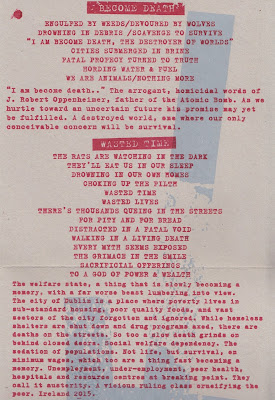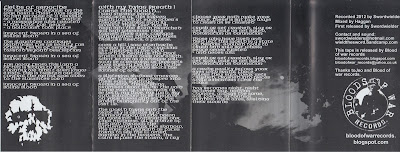If you ask your next-door neighbour about his favourite contemporary crust bands, Putrefaction are unlikely to come up in the discussion. And the hypothesis is not rhetorical, go ahead, chat him up and you'll see I am right. It is, along other dismaying things like the recent French elections or international shipping costs, one of the many sad truths of our time and I do not have a reasonable explanation for this discrepancy.
It would be far-fetched to claim that Putrefaction have gone completely unnoticed, as I remember that their 2012 Lp did garner some well-deserved attention, but this wonderful Ep pretty much flew under the radar. If the amount of active crusty metal-punk bands is any indication, it is then sound to assume that Putrefaction's sound is not happening at the wrong time. Could they be at the wrong place, being from Dublin? Yet another instance of the "had-they-been-from-Portland" syndrome? Still, the ever-increasing globalization of punk music through the internet should precisely keep great crust music from remaining relatively unknown and, ideally, foster both a more horizontal way of apprehending music from multiple backgrounds and an urge to discover exciting bands from all over, as vertiginous as it might be given the spectrum of inquiry. But then, the internet also tends to exacerbate pre-existing glorifications of some parts of the scene at the expense of others. We have a window open to the world and yet use it as the mirror of our obsessions. Could the world wide web be the ultimate reflection of this duality? Or has our attention span been permanently damaged by the overwhelming mass of information continuously renewed before our eyes? Or perhaps the name "Putrefaction" sounds too ingrained in death-metal lexical mythology and might scare "da punx" away?
You should ask your neighbour again, unless he threatened to call the cops the first time. If so, it might be safer to leave him on his own and just leave a note in his mailbox or something.
Putrefaction are friends so I could be a little partial to them but have no fear, I will be just as subjective as usual, prone to defend the crust underdogs against the trendies (that I always picture wearing Fall of Efrafa shirts and Metal Punk Death Squad hats for some obscure reason that even my shrink cannot make sense of). As I remember it, the idea of Putrefaction was born in 2005 in Dublin when Eric (the handsome guitarist/singer, formerly in Easpa Measa and currently also singing for Rats Blood) mentioned that he was thinking of forming some kind of D-beat band under that moniker. Helped in this task by brothers Donal and Eoin, it first came into being with the 2007 Destroyers demo. The demo was a rather raw but promising 8-song effort that gave the listener an idea of what the band was then trying to achieve. It could be roughly described as an aggressive blend of State of Fear-type crust, Hellshock's epic stenchcore style and Repulsion's primitive extreme metal (the punk as fuck Sepultura cover is pretty ace). There were some genuinely good ideas on this one. Though it was partly impaired by a raw punk production, it still conferred the demo some sort of Hellhammer charm, so even if it was not a groundbreaking recording, at least it had the relative merits to sound unpretentiously spontaneous and angry. It did not, however, prepare the unsuspecting listener for the mammoth metal-punk scorcher as unleashed on Blood cult five years later.
To be fair (time for confidences), when the Blood cult Lp came out in 2012, I had almost forgotten about Putrefaction. I do not know how active they were locally between 2007 and 2012, but the truth is that I thought they had basically stopped playing so I was both pleased and surprised when a full album was released on four reliable labels such as Underground Movement (also responsible for the Coitus discography and the brilliant Bullet Ridden album), Distro-Y Records, Phobia Records and Ratbone Records. Without even getting into the songwriting, the progression from the demo is immense. The album has a massive sound and, as tempting as the claim that the musicianship considerably improved appears, it might be closer to the truth to say that the effort is that much more focused and cohesive that it allows the instruments to really shine. Blood cult is a more diverse work which borrows more heavily from the world of extreme metal than the demo. The direct crustcore element is toned down to give room to a more refined death-metal influence that never feels contrived and mechanical. Although Putrefaction's investigative fields are apparent, the band never sounds derivative or generic. More crucially, despite the diverse stylistic additions, the music does not feel disparate and the different phases sound like adhering parts of a smooth whole and not like a bland series. I would argue that this is what makes the album good: it sounds whole. I may not love to death all the elements when taken separately, but as an entity, they all work. On this album, Putrefaction borrowed from old-school death-metal bands like Repulsion or Autopsy, but also from modern metal crust acts like Limb From Limb or Hellshock, from the dark hardcore punk sound of Tragedy or World Burns To Death and the epic cavemen crustcore of Cop On Fire and Consume. The list of possible influences is endless and it would be pointless (and a probable tedious read) to go on, as what really matters here is that the band tied all of these elements in the songwriting with one thing: mood. Whether they go for a brutal death-metal beat or for a mid-paced heavy hardcore moment, the mood remains the compass. Putrefaction sound like a trance-inducing apocalyptic ride into the industrial wasteland as a symbol of the decay of an ever-rotting society. Sure, the hellish bike (it has to be a motorbike, right?) sometimes takes a turn or goes faster but the destination does not change.
When Putrefaction released their Scavenger Ep two years ago, this time I was ready to ruck and when they played in Paris I bought it in a heartbeat (and let me tell you that they were one of the most convincing crust trios I have ever witnessed live). If Blood Cult was a dantean journey to the threshold of Hell's gates, Scavenger can be described as the mad descent into the Inferno itself as it sounds like the (un)natural progression of the Lp. It is a great Ep with memorable clever riffs that never falls into complacency, enhanced with a thick, heavy and aggressive production that is burning and abrasive and never sounds overdone or artificially angry. Superb job on that level. The bass sound is ominous and distorted and confers a crunchy texture to the songs, the guitar has that vibrating, filthy metallic quality but keeps a distinctively hardcore aggression and the drumming is excellent, just at the right level, pummeling but neither buried nor overshadowing everything else. The vocals are hoarse, guttural and aptly expressive of the sense of desperate rage that the band goes for, and, more importantly, they never sound forced or ridiculously grandiloquent.
Despite the shorter format, Scavenger is still a pretty varied, highly mood-driven work with some delicious hooks in the arrangements and the articulations. "Welcome death" is a crushingly epic introduction to the record, reminiscent of vintage Stormcrow (especially in the textures), Limb From Limb and of a punkified Bolt Thrower; "Wasted time" is a mid-paced dark hardcore anthem (skipping on my copy for some unfathomable reason) that brings Tragedy and Wolfpack's best moments to mind; "After the storm" is an epic mid-00's "gruff-yet-modern" crustcore number that nods towards Cop On Fire and Nuclear Death Terror (with perhaps something of the Spanish D-Beat/crust school as well); finally, "Ballast existence" goes back effortlessly to Stormcrow heaviness and concludes the last ride in style. Although they certainly build on old-school metal and punk (you won't be hearing silly technical blast beats, pseudo screamo atmospheric parts or similar nonsensical atrocities), Putrefaction sound modern in a good way, dark, powerful and epic. They are not openly referential and, in spite of some unavoidable sonic familiarity, write songs that are singular, catchy and strong enough to stand out from the crowd. The lyrics are another definite strongpoint, pissed, genuinely political and carefully written despite their directness, they depict the homicidal and exploitative nature of modern politics instead of rehashing dull doomsday allegories. I particularly enjoy "Wasted time," with words about "A vicious ruling class crucifying the poor. Ireland 2015" that read bitterly familiar in the current era of austerity politics.
A truly cracking record released on Distro-Y (and still available) that you could argumentatively recommend to your neighbour now (never underestimate the connective power of crust).

























